|
|
|
Sort Order |
|
|
|
Items / Page
|
|
|
|
|
|
|
| Srl | Item |
| 1 |
ID:
090818


|
|
|
|
|
| Publication |
2009.
|
| Summary/Abstract |
Electoral campaigns are the foundation of democratic governance; yet scholarship on the content of campaign communications remains underdeveloped. In this paper, we advance research on U.S. congressional campaigns by integrating and extending extant theories of campaign communication. We test the resulting predictions with a novel dataset based on candidate Web sites over three election cycles. Unlike television advertisements or newspaper coverage, Web sites provide an unmediated, holistic, and representative portrait of campaigns. We find that incumbents and challengers differ across a broad range of behavior that reflects varying attitudes toward risk, that incumbents' strategies depend on the competitiveness of the race, and that candidates link negative campaigning to other aspects of their rhetorical strategies. Our efforts provide researchers with a basis for moving toward a more complete understanding of congressional campaigns.
|
|
|
|
|
|
|
|
|
|
|
|
|
|
|
|
| 2 |
ID:
168705


|
|
|
| 3 |
ID:
105194
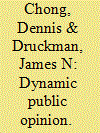

|
|
|
|
|
| Publication |
2010.
|
| Summary/Abstract |
We develop an approach to studying public opinion that accounts for how people process competing messages received over the course of a political campaign or policy debate. Instead of focusing on the fixed impact of a message, we emphasize that a message can have variable effects depending on when it is received within a competitive context and how it is evaluated. We test hypotheses about the effect of information processing using data from two experiments that measure changes in public opinion in response to alternative sequences of information. As in past research, we find that competing messages received at the same time neutralize one another. However, when competing messages are separated by days or weeks, most individuals give disproportionate weight to the most recent communication because previous effects decay over time. There are exceptions, though, as people who engage in deliberate processing of information display attitude stability and give disproportionate weight to previous messages. These results show that people typically form significantly different opinions when they receive competing messages over time than when they receive the same messages simultaneously. We conclude by discussing the implications of our findings for understanding the power of communications in contemporary politics.
|
|
|
|
|
|
|
|
|
|
|
|
|
|
|
|
| 4 |
ID:
160326


|
|
|
|
|
| Summary/Abstract |
Survey and laboratory experiments are increasingly common in political science. Investment in experimental data collection comes with costs and benefits, particularly for graduate students and advisers. This article describes a set of institutionalized procedures we have adopted with the goal of capitalizing on the advantages that come with experimental research. This includes requiring planning documents, holding research-group meetings, and centralizing data collection. We conclude by discussing the limitations of our approach, ultimately highlighting the need for more disciplinary conversation about how to best structure research groups to produce quality research and advising.
|
|
|
|
|
|
|
|
|
|
|
|
|
|
|
|
| 5 |
ID:
121090
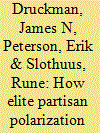

|
|
|
|
|
| Publication |
2013.
|
| Summary/Abstract |
Competition is a defining element of democracy. One of the most noteworthy events over the last quarter-century in U.S. politics is the change in the nature of elite party competition: The parties have become increasingly polarized. Scholars and pundits actively debate how these elite patterns influence polarization among the public (e.g., have citizens also become more ideologically polarized?). Yet, few have addressed what we see as perhaps more fundamental questions: Has elite polarization altered the way citizens arrive at their policy opinions in the first place and, if so, in what ways? We address these questions with a theory and two survey experiments (on the issues of drilling and immigration). We find stark evidence that polarized environments fundamentally change how citizens make decisions. Specifically, polarization intensifies the impact of party endorsements on opinions, decreases the impact of substantive information and, perhaps ironically, stimulates greater confidence in those-less substantively grounded-opinions. We discuss the implications for public opinion formation and the nature of democratic competition.
|
|
|
|
|
|
|
|
|
|
|
|
|
|
|
|
| 6 |
ID:
121024
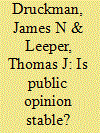

|
|
|
|
|
| Publication |
2012.
|
| Summary/Abstract |
Public opinion matters, both as a central element of democratic theory and as a substantive foundation for political representation. The origins and nature of public opinion have long attracted the attention of social scientists. Yet a number of questions remain; among the more perplexing is whether-and under what conditions-public opinion is stable. The answer depends in large part on whether one looks at aggregations of individual opinions (macro public opinion) or at the individual opinions themselves (micro public opinion). In this essay, we explore the macro/micro divide and offer a framework to determine when opinions are likely to be stable or volatile. This framework reflects both the content of the political environment and the nature of individuals' opinions. Using public opinion dynamics surrounding the Patriot Act as a primary example, we discuss the role of opinion stability in interpreting public opinion and in understanding the normative implications of public preferences.
|
|
|
|
|
|
|
|
|
|
|
|
|
|
|
|
| 7 |
ID:
059293
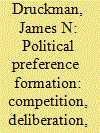

|
|
|
| 8 |
ID:
113560
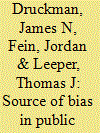

|
|
|
|
|
| Publication |
2012.
|
| Summary/Abstract |
A long acknowledged but seldom addressed problem with political communication experiments concerns the use of captive participants. Study participants rarely have the opportunity to choose information themselves, instead receiving whatever information the experimenter provides. We relax this assumption in the context of an over-time framing experiment focused on opinions about health care policy. Our results dramatically deviate from extant understandings of over-time communication effects. Allowing individuals to choose information themselves-a common situation on many political issues-leads to the preeminence of early frames and the rejection of later frames. Instead of opinion decay, we find dogmatic adherence to opinions formed in response to the first frame to which participants were exposed (i.e., staunch opinion stability). The effects match those that occur when early frames are repeated multiple times. The results suggest that opinion stability may often reflect biased information seeking. Moreover, the findings have implications for a range of topics including the micro-macro disconnect in studies of public opinion, political polarization, normative evaluations of public opinion, the role of inequality considerations in the debate about health care, and, perhaps most importantly, the design of experimental studies of public opinion.
|
|
|
|
|
|
|
|
|
|
|
|
|
|
|
|
|
|
|
|
|